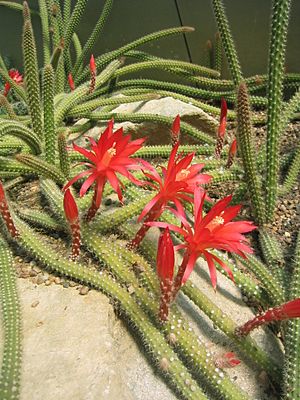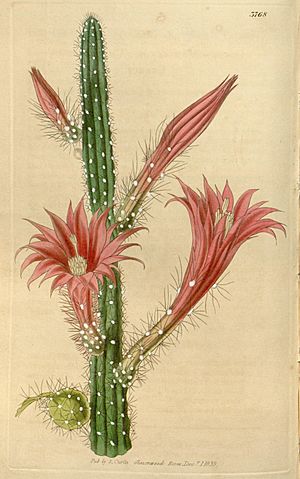Aporocactus martianus facts for kids
Quick facts for kids Aporocactus martianus |
|
|---|---|
 |
|
| Conservation status | |
| Scientific classification |
|
| Kingdom: | Plantae |
| Clade: | Tracheophytes |
| Clade: | Angiosperms |
| Clade: | Eudicots |
| Order: | Caryophyllales |
| Family: | Cactaceae |
| Subfamily: | Cactoideae |
| Genus: | Aporocactus |
| Species: |
A. martianus
|
| Binomial name | |
| Aporocactus martianus (Zucc. ex Pfeiff.) Britton & Rose
|
|
| Script error: The function "autoWithCaption" does not exist. | |
| Synonyms | |
|
|
Script error: No such module "Check for conflicting parameters".
Aporocactus martianus is a type of cactus that grows in Oaxaca, Mexico. It is also known by its other scientific name, Disocactus martianus. This plant is quite unique because of its long, hanging stems and bright red flowers.
Description
This cactus grows by spreading out, sometimes on rocks. It uses special roots that hang in the air. The stems are thick and round, and they can hang down or creep along the ground. They can grow up to 1.5 meters (about 5 feet) long and be about 2.5 centimeters (1 inch) thick.
The stems have 8 to 10 slightly bumpy ridges. This cactus has two kinds of spines:
- A few pale brown spines in the middle, up to 12 millimeters (about half an inch) long.
- More yellowish spines around them, which are shorter, only 5 to 7 millimeters (about a quarter-inch) long.
In summer, Aporocactus martianus produces beautiful, bright red flowers. These flowers open during the day and are quite large, about 10 to 12 centimeters (4 to 5 inches) wide and 5 to 7 centimeters (2 to 3 inches) long. They usually stay open for a couple of days. After the flowers, the plant grows round, green fruits that are about 2 centimeters (less than an inch) across. This cactus is also "viviparous," which means its seeds can start growing while still attached to the parent plant.
How it was Named
This cactus was first described in 1837 by a scientist named Ludwig Georg Karl Pfeiffer. He called it Cereus martianus. Later, in 1991, another scientist named Wilhelm Barthlott moved the species to the Disocactus group.
Over the years, this plant has been given several different scientific names by various botanists. These different names for the same plant are called "synonyms." Some of its past names include:
- Cereus martianus Zucc. (1832)
- Eriocereus martianus Riccob. (1909)
- Aporocactus martianus Britton & Rose (1920)
- Aporocactus conzattii Britton & Rose (1920)
- Cereus conzattii (Britton & Rose) A. Berger (1929)
- Aporocactus martianus var. Conzattii (Britton & Rose) PVHeath (1992)
More recently, in 2017, a group of scientists including Nadja Korotkova, Thomas Borsch, and Salvador Arias studied this plant again. They decided that all these different names actually refer to the same plant, and they consider it to be Aporocactus martianus.
Images for kids
See also
 In Spanish: Disocactus martianus para niños
In Spanish: Disocactus martianus para niños
 | William Lucy |
 | Charles Hayes |
 | Cleveland Robinson |





